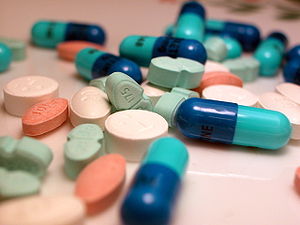Medication/ja: Difference between revisions
Created page with "{{Main/ja|Essential medicines/ja|Societal views on patents/ja}}" Tags: Mobile edit Mobile web edit |
Created page with "Novartisは、インドにおける薬物グリベックの特許をめぐってインド政府と長期にわたる争いを繰り広げ、Novartis対インド連合&その他として知られる訴訟で最高裁に持ち込まれた。最高裁は僅差でNovartisに不利な判決を下したが、薬物特許反対派はこれを大きな勝利と主張した。" |
||
| Line 377: | Line 377: | ||
{{Main/ja|Essential medicines/ja|Societal views on patents/ja}} | {{Main/ja|Essential medicines/ja|Societal views on patents/ja}} | ||
[[World Health Organization/ja|世界保健機関]](WHO)が定義する必須医薬品とは、「人口の大多数の医療ニーズを満たす薬物であり、それゆえ、適切な量、適切な剤形、地域社会が購入可能な価格で、いつでも入手可能であるべきである。最近の研究によると、HIV治療薬以外のWHOの必須医薬品リストに掲載されている医薬品のほとんどは、開発途上国では特許を取得しておらず、これらの[[access to medicines/ja|医薬品へのアクセス]]が普及していないのは、経済発展の基本的な問題、すなわちインフラの欠如と貧困から生じていることがわかった。[[Médecins Sans Frontières/ja|国境なき医師団]]はまた、「[[Campaign for Access to Essential Medicines/ja|必須医薬品へのアクセスキャンペーン]]」を実施しており、主に開発途上国で発生している現在治療不可能な病気により多くのリソースを割くよう提唱している。[[Access to Medicine Index/ja|医薬品アクセス指数]](Access to Medicine Index)は、製薬会社が開発途上国で自社製品をどの程度利用可能にしているかを追跡するものである。 | |||
[[:ja:知的所有権の貿易関連の側面に関する協定|TRIPS協定]]や[[:en:Doha Declaration|ドーハ宣言]]を含む1990年代の[[:ja:世界防疫機構|世界貿易機関]](WTO)交渉は、医薬品の国際貿易と知的財産権が交差する問題を中心に行われ、先進国は新薬開発のための投資を保護するための強力な[[:ja:知的財産権|知的財産権]]を求め、開発途上国は自国のジェネリック医薬品産業を振興し、[[:en:compulsory licenses|強制ライセンス]]によって国民が医薬品を入手できるようにすることを求めた。 | |||
[[ | |||
<div lang="en" dir="ltr" class="mw-content-ltr"> | <div lang="en" dir="ltr" class="mw-content-ltr"> | ||
| Line 389: | Line 385: | ||
</div> | </div> | ||
[[Novartis]]は、インドにおける薬物[[Gleevec/ja|グリベック]]の特許をめぐってインド政府と長期にわたる争いを繰り広げ、[[:en:Novartis v. Union of India & Others|Novartis対インド連合&その他]]として知られる訴訟で最高裁に持ち込まれた。最高裁は僅差でNovartisに不利な判決を下したが、薬物特許反対派はこれを大きな勝利と主張した。 | |||
[[ | |||
<div lang="en" dir="ltr" class="mw-content-ltr"> | <div lang="en" dir="ltr" class="mw-content-ltr"> | ||
Revision as of 07:45, 23 July 2023
| Medication/ja | |
|---|---|
 Packages of medication | |
| Other names | Medicine, drug, pharmaceutical, pharmaceutical preparation, pharmaceutical product, medicinal product, medicament, remedy |

医薬品(Medication)(medicament、medicine、pharmaceutical drug、medicinal drug、または単にdrugと呼ばれる)とは、診断、治療、病気の予防に用いられる薬物である。 薬物治療(薬物療法)は医療分野の重要な一部であり、継続的な進歩のために薬学の科学に、適切な管理のために薬局に依存するものである。
医薬品は複数の方法で分類されている。重要な区分のひとつは管理レベルによるもので、処方薬(医師、医師助手、看護師の指示によってのみ薬剤師が調剤するもの)と市販薬(消費者が自分で注文できるもの)を区別している。もう一つの重要な区別は、通常化学合成から得られる従来の低分子医薬品と、組み換えタンパク質、ワクチン、治療的に使用される血液製剤(IVIGなど)、遺伝子治療、モノクローナル抗体、細胞治療(幹細胞治療など)を含むバイオ医薬品の区別である。その他、作用機序、投与経路、影響を受ける生物学的システム、治療効果によって医薬品を分類する方法がある。精巧で広く使われている分類システムに、解剖学的治療化学分類システムがある。世界保健機関(WHO)は、必須医薬品のリストを作成している。
創薬と薬物開発は、製薬会社、学術研究者、政府によって行われる、複雑で費用のかかる取り組みである。創薬から商業化までのこのような複雑な道のりの結果、開発パイプラインを通じて薬物候補を前進させるための標準的な手法として、提携が行われるようになった。政府は、一般に、どのような薬を販売できるか、どのように薬を販売するか、また、法域によっては、薬物の価格設定を規制している。薬物の価格設定や使用済み薬物の処分をめぐって、論争が起きている。
定義
医薬品とは、病気の治療や治癒に使用される薬や化合物のことである。ブリタニカ百科事典によると、薬とは病気の治療や痛みを和らげるために使用される物質である。
国立がん研究所の定義によれば、薬の剤形には、錠剤、カプセル、液体、クリーム、パッチが含まれることがある。薬は、口からや、静脈に注入、耳や目に滴下するなど、さまざまな方法で投与することができる。有効成分を含まない薬で、研究調査に使用されるものはプラセボと呼ばれる。
ヨーロッパではMedicinal productと呼ばれ、EU法で次のように定義されている:
- "ヒトの疾病を治療または予防する特性を有するものとして提示された物質または物質の組み合わせ"
- 「薬理学的、免疫学的、代謝学的作用を発揮することによって生理的機能を回復、修正、変更する目的で、または医学的診断を行う目的で、ヒトに使用または投与することができる物質または物質の組合せ」。
米国では、薬物とは:
- 公式の薬局方や処方箋で認められている物質である。
- 病気の診断、治療、緩和、治療、予防に使用することを目的とした物質。
- 身体の構造または機能に影響を与えることを目的とした物質(食品を除く)。
- 医薬品の成分として使用することを意図した物質であって、デバイスまたはデバイスの構成要素、部品、付属品ではない。
- 生物学的製剤はこの定義に含まれ、一般に同じ法規制の対象となるが、その製造工程(化学的工程と生物学的工程)については違いがある。
使用状況
アメリカの高齢者の薬物使用状況が調査されており、2005年から2006年にかけて調査された平均年齢71歳の2,377人のグループでは、84%が少なくとも1つの処方薬を服用、44%が少なくとも1つの市販薬(OTC)を服用、52%が少なくとも1つの栄養補助食品を服用し、2010年から2011年にかけて調査された平均年齢71歳の2,245人の高齢者のグループでは、その割合は88%、38%、64%となった。
分類
重要な分類の一つは、従来の低分子医薬品(通常、化学合成から得られる)と生物学的製剤(組み換えタンパク質、ワクチン、治療的に用いられる血液製剤(IVIGなど)、遺伝子治療、細胞治療(例えば、幹細胞治療)を含む)との間の分類である。
医薬品または薬物は、化学的性質、投与方法または投与経路、影響を受ける生物学的系、または治療効果など、作用機序やその薬理作用または活性などの薬理学的特性に基づいて、その起源以外にも様々なグループに分類される。精巧で広く使われている分類システムに、解剖学的治療化学分類システム(ATCシステム)がある。世界保健機関(WHO)は、必須医薬品のリストを作成している。
医薬品のクラスの一例として、以下のものがある:
- 解熱鎮痛剤: 熱を下げる (発汗/発熱)
- 鎮痛剤: 痛みをやわらげる (痛み止め)
- 坑マラリア薬: マラリアの治療
- 抗生物質: 細菌の繁殖阻害
- 殺菌剤: 火傷、切り傷、創傷付近の雑菌の繁殖を防止する
- 気分安定薬: リチウム塩 と バルプロ酸
- ホルモン補充: プレマリン
- 経口避妊薬: エノビッド、二相性 ピル、三相性 ピル
- 覚醒剤: メチルフェニデート, アンフェタミン
- 精神安定剤s: メプロバメート, クロルプロマジン, レセルピン, クロルジアゼポキシド, ジアゼパム, アルプラゾラム
- スタチン: ロバスタチン, プラバスタチン, シンバスタチン
医薬品は、他の分類とは別に「特殊(specialty)」と表現されるものもある。これは、投与が困難である可能性があり、投与中に特別な取り扱いを必要とし、投与中および投与直後に患者のモニタリングを必要とし、その使用を制限する特定の規制要件を持ち、他の薬物と比較して一般的に高価な、定義されていない薬物のクラスである。
医薬品の種類
消化器系用
- 上部腸管: 制酸剤, 逆流防止剤, 鼓腸薬, 坑ドーパミン薬, プロトンポンプ阻害剤 (PPIs), H2-受容体拮抗薬, 細胞保護剤, プロスタグランジン類似体
- 下部腸管: 下剤, 鎮痙薬, 止瀉剤, 胆汁酸隔離剤, オピオイド
循環器用
- 一般: β受容体遮断薬 (βブロッカー)、カルシウム拮抗薬、利尿剤、強心配糖体、坑不整脈薬、硝酸塩、坑狭心症薬、血管収縮薬、血管拡張薬
- 血圧 に影響する/降圧薬: ACE阻害薬、アンジオテンシン受容体拮抗薬、β遮断薬、α遮断薬、カルシウム拮抗薬、サイアザイド系利尿薬、ループ利尿薬、アルドステロン阻害薬
- 凝固: 坑凝固薬、ヘパリン、坑血小板薬、血栓溶解薬、抗血友病因子薬、止血薬
- LDLコレステロールを低下させるHMG-CoA還元酵素阻害薬 (スタチン): 高脂血症治療薬
中枢神経系用
中枢神経系に影響を及ぼす薬物: 向精神薬、睡眠薬、麻酔薬、抗精神病薬、オイゲロイック薬、抗うつ薬(三環系抗うつ薬、モノアミン酸化酵素阻害薬、リチウム塩、選択的セロトニン再取り込み阻害薬(SSRI)を含む)、制吐薬、抗けいれん薬/抗てんかん薬、抗不安薬、バルビツール酸薬、運動障害(パーキンソン病など)治療薬、向精神薬、興奮薬(アンフェタミンを含む)、ベンゾジアゼピン系薬剤、シクロピロロン系薬剤、ドパミン拮抗薬、抗ヒスタミン薬、コリン作動薬、抗コリン薬、催吐薬、カンナビノイド、5-HT(セロトニン)拮抗薬などがある。
痛み用
意識のため (麻酔薬)
筋骨格障害用
筋骨格系障害の薬物の主なカテゴリーは以下の通りである: 非ステロイド性抗炎症薬(COX-2選択的阻害薬を含む)、筋弛緩薬、神経筋薬、抗コリンエステラーゼ薬である。
眼科用
- 一般:アドレナリン作動性神経遮断薬、収斂薬
- 診断薬: 局所麻酔薬、 交感神経刺激薬、 副交感神経溶解薬、 散瞳薬、 調節麻痺剤
- 抗菌薬: 抗生物質、 外用抗生物質、サルファ剤, アミノグリコシド系薬物, フルオロキノロン系薬物
- 抗ウイルス薬
- 抗真菌薬: イミダゾール系、ポリエン系
- 抗炎症薬: 非ステロイド性抗炎症薬、コルチコステロイド
- 抗アレルギー: 肥満細胞阻害剤
- 抗緑内障薬: アドレナリン作動薬、β遮断薬、炭酸脱水酵素阻害薬/高浸透圧薬、コリン作動薬s, ミオティック、副交感神経刺激薬、 プロスタグランジン作動薬/プロスタグランジン阻害薬, ニトログリセリン
耳、鼻、口腔咽頭用
抗生物質, 交感神経刺激薬、抗ヒスタミン薬、抗コリン薬s, 非ステロイド性抗炎症薬、 コルチコステロイド薬、消毒薬、局所麻酔薬、坑真菌薬、角質溶解薬
呼吸器系用
気管支拡張薬、鎮咳薬、鎮咳去痰薬s, 鬱血除去薬、吸入および全身性 コルチコステロイド、β2-アドレナリン作動薬、 坑コリン薬、肥満細胞安定化薬、ロイコトリエン拮抗薬
内分泌疾患用
アンドロゲン、抗アンドロゲン薬、エストロゲン、性腺刺激ホルモン、副腎皮質ホルモン、ヒト成長ホルモン、インスリン、抗糖尿病薬(スルホニル尿素、ビグアナイド/メトホルミン、チアゾリジン薬、 インスリン), 甲状腺ホルモン、抗甲状腺薬物、カルシトニン、ジホスホネート、バソプレシン類似物質
生殖器系または泌尿器系
坑真菌薬、アルカリ化薬、キノロン系抗菌薬、抗生物質、コリン作動薬、坑コリン薬、鎮痙薬、5α還元酵素阻害薬、選択的α1遮断薬、シルデナフィル、不妊治療薬
避妊用
産婦人科用
非ステロイド性抗炎症薬、坑コリン薬、止血薬、坑線溶薬、ホルモン補充療法 (HRT)、骨調整薬、β受容体作動薬、卵胞刺激ホルモン、黄体形成ホルモン、LHRH、ガモレン酸、ゴナドトロピン放出阻害薬、黄体ホルモン、ドーパミン作動薬、エストロゲン、プロスタグラジン、ゴナドレリン、クロミフェン、タモキシフェン、ジエチルスチルベストロール
皮膚用
皮膚軟化剤、かゆみ止め、抗真菌剤、殺菌剤、抗疥癬薬、殺シラミ薬、乾留液製品、ビタミンA誘導体、ビタミンD類似体、角質溶解薬、研磨材、全身性抗生物質、外用 抗生物質、ホルモン、剥離剤、滲出液吸収剤、 線維素溶解、タンパク質分解、サンスクリーン剤、制汗剤、副腎皮質ホルモン、免疫調整剤
感染症と蔓延用
抗生物質、坑真菌薬、坑レプロ薬、坑結核薬、坑マラリア薬、駆虫薬、アメーバ駆除薬、坑ウィルス薬、坑寄生虫薬、プロバイオティクス、プレバイオティクス、坑毒素薬、駆虫薬
免疫系
ワクチン、免疫グロブリン、免疫抑制剤、インターフェロン、モノクローナル抗体
アレルギー疾患用
坑アレルギー剤、坑ヒスタミン剤、NSAIDs、コルチコステロイド剤
栄養
トニック、電解質とミネラル (鉄製剤と マグネシウム製剤を含む)、非経口栄養剤、ビタミン剤、 坑肥満薬、タンパク同化薬、造血薬、食品製剤
腫瘍性疾患用
細胞毒性薬、治療用抗体、性ホルモン、アロマターゼ阻害剤、ソマトスタチン阻害剤、遺伝子組み換えインターロイキン、G-CSF、エリスロポエチン
診断薬
安楽死用
安楽死薬は、安楽死や医師による自殺幇助に用いられる。多くの国では安楽死は法律で認められていないため、そのような国では安楽死のための医薬品は認可されない。
投与

一つの薬物には、単一または複数の有効成分が含まれている。
投与とは、患者が薬を服用することである。薬物投与には、経腸(消化管経由)、体内への注射、その他の経路(経皮、経鼻、目、耳、泌尿生殖器)の3つに大別される。
経口投与の最も一般的な形態である経口投与は、錠剤やカプセル剤、シロップや懸濁液などの液剤など、さまざまな剤形を用いて行うことができる。医薬品を服用するその他の方法としては、頬から入れる頬内投与、舌下から入れる舌下投与、目や耳に滴下する点眼・点耳投与、経皮投与(皮膚に塗布する)などがある。
ボーラスとして1回投与することもできる。投与頻度は、Quaque VIII HoraからQ8Hと読み、8時間ごとなど、ラテン語から略されることが多い。薬物の投与頻度は、1日あたりの使用回数(例えば、1日4回)で表されることが多い。これは[指定する]事象に関連した情報(例:食前1時間、朝、就寝時)を含むか、間隔を補完するものであるが、同等の表現でも意味合いが異なる場合がある(例:8時間ごとと1日3回)。
創薬
medicine/ja、バイオテクノロジー、薬学の分野において、創薬とは新薬が発見されるプロセスを指す。
歴史的には、薬物は伝統的な治療法から有効成分を同定したり、偶然の発見によって発見されてきた。その後、合成低分子化合物、天然物、抽出物からなる化学物質ライブラリーが、無傷の細胞や全生物を用いてスクリーニングされ、古典的薬理学として知られるプロセスで、望ましい治療効果を持つ物質が同定された。ヒトゲノムの塩基配列が解読され、大量の精製タンパク質の迅速なクローニングと合成が可能になってからは、リバース・ファーマコロジー(逆薬理学)として知られるプロセスで、疾患修飾作用があると仮定される単離された生物学的標的に対して、大量の化合物ライブラリーをハイスループットスクリーニングすることが一般的になった。このようなスクリーニングで得られたヒット化合物は、細胞で、そして動物で有効性が検証される。さらに最近になって、科学者たちは生体分子の形状を原子レベルで理解することができるようになり、その知識を利用して薬物候補をデザインすることができるようになった(ドラッグ・デザインを参照)。
現代の創薬では、親和性、選択性(副作用の可能性を減らす)、有効性/効力、代謝安定性(半減期を長くする)、経口バイオアベイラビリティを高めるために、スクリーニングでヒットした化合物を特定し、薬化学的に最適化する。これらの要件をすべて満たす化合物が同定されると、臨床試験に先立ち、薬物開発のプロセスが開始される。これらのステップの1つ以上には、必ずしもコンピュータ支援薬物設計が含まれるとは限らない。
技術や生物学的システムの理解が進歩したにもかかわらず、薬物探索は依然として時間がかかり、「高価で、困難で、非効率的なプロセス」であり、新しい治療法の発見率は低い。2010年、新規分子化合物(NME)1つあたりの研究開発費は約18億米ドルだった。薬物の創製は製薬会社によって行われ、時には大学の研究支援を受けることもある。創薬の「最終製品」は、潜在的な薬物に関する特許である。薬物には非常に高価な第I相、第II相、第III相臨床試験が必要で、そのほとんどは失敗する。小企業は重要な役割を担っており、多くの場合、臨床試験を実施する資源を持つ大企業に権利を売却する。
創薬は医薬品開発とは異なる。創薬とは、新しい薬を発見するプロセスである。同時に、薬物開発は新薬分子を臨床に送り出すことである。広義の定義では、適切な分子標的を見つける基礎研究プロセスから薬物の商業的発売をサポートするまでのすべてのステップを包含する。
開発
医薬品開発とは、創薬プロセスを通じてリード化合物が特定された後、新薬を市場に投入するプロセスを指す。前臨床研究(微生物/動物)と臨床試験(ヒト)が含まれ、薬物を販売するための規制当局の承認を得る段階を含むこともある。
創薬: 薬物開発プロセスは、新薬を特定するプロセスである創薬から始まる。
開発: 天然物から抽出した化学物質を用いて、経口用の錠剤、カプセル剤、シロップ剤などを作る。直接血液に注入する注射薬、目や耳に入れる点滴薬などがある。
前臨床試験:薬物がヒトに使用できることを確認するため、実験室や動物で試験を行う。
臨床試験: 薬物を人に使用し、安全性を確認する。
FDA審査:薬物を上市する前にFDAに送られる。
FDAの市販後審査: 薬物が一般に販売された後、その安全性についてFDAによる審査と監視が行われる。
レギュレーション
薬物の規制は国によって異なる。米国のように、単一の機関によって国家レベルで規制されている国もある。また、オーストラリアのように、州レベルで、あるいは州レベルと国レベルの両方で、さまざまな機関によって規制されている国もある。治療用医薬品規制の役割は、主に国民の健康と安全を守ることである。規制は、規制の対象となる治療用医薬品の安全性、品質、有効性を確保することを目的としている。ほとんどの法域において、治療用医薬品は上市が許可される前に登録されなければならない。通常、消費者に対するリスクに応じて、特定の治療用医薬品の入手がある程度制限される。
法域によっては、薬物は、特別な制限なしに入手可能な一般用医薬品(OTC)と、副作用や禁忌のリスクがあるため、医療ガイドラインに従って免許を持つ医師が処方しなければならない医療用医薬品とに分けられる。OTCと処方箋の正確な区別は、法的管轄によって異なる。第3のカテゴリーである「ビハインド・ザ・カウンター」薬物は、一部の法域で実施されている。これらは処方箋を必要としないが、調剤薬局に保管され、公衆の目に触れず、薬剤師または薬剤師技師によってのみ販売されなければならない。医師はまた、適応外使用、つまり薬物が本来規制当局によって承認されていない目的で処方薬を処方することができる。薬物治療紹介の分類は、薬剤師と医師間の紹介プロセスの指針となる。
国連の国際麻薬統制委員会は、特定の薬物を禁止する世界法を制定している。その取引と消費(該当する場合)が禁止されている化学物質と植物の長いリストを公表している。一般用医薬品は、ほとんどの人が指示通りに服用しても誤って怪我をすることはないほど安全であると考えられているため、制限なく販売されている。イギリスなど多くの国では、「薬局医薬品」という第三のカテゴリーがあり、これは登録薬局でのみ、薬剤師によって、または薬剤師の監督下で販売することができる。
医療過誤には、過剰処方や多剤併用、処方ミス、禁忌、用法・用量指示の不備などがある。2000年、デルファイ法による会議が開かれ、処方過誤の定義が検討された。この会議の動機は、処方過誤の定義があいまいであることと、研究において統一した定義を用いる必要性にあった。
薬価
多くの国で薬価は規制されている。
イギリス
イギリスでは、薬価規制制度は国民保健サービスが適正価格で薬物を購入できるようにすることを目的としている。薬価は、北アイルランドと英国政府の権限で行動する保健省と、製薬業界ブランドの代表者である英国製薬団体連合会(ABPI)との間で交渉される。2017年、PPRSによって設定されたこの支払い割合は4,75%となる。
カナダ
カナダでは、特許薬価審査委員会が薬物の薬価を審査し、薬価が過大であるか否かを決定する。このような場合、薬物メーカーは適切な規制機関に価格案を提出しなければならない。さらに、「国際治療クラス比較テストは、審査対象の特許医薬品の全国平均取引価格を比較する責任がある」とされている: フランス、ドイツ、イタリア、スウェーデン、スイス、英国、米国である。
ブラジル
ブラジルでは、1999年以降、ジェネリック医薬品(Medicamento Genérico)という名称の法律によって薬価が規制されている。
インド
インドでは、薬価は国家薬価局によって規制されている。
アメリカ
米国では、薬価は部分的に規制されていないが、その代わりに製薬会社と保険会社の交渉の結果となっている。
薬価が高いのは、政府がメーカーに独占権を与えているためと考えられている。新薬の開発費も上がり続けている。科学技術の著しい進歩にもかかわらず、政府が承認したブロックバスター新薬の数は、1950年以来9年ごとに10億ドルあたり半減している。
ブロックバスター医薬品
ブロックバスター医薬品とは、製薬会社が1年間に10億ドル以上の売上を上げる薬物のことである。シメチジンは史上初めて年間10億ドル以上の売上を達成した薬物であり、これが最初のブロックバスター薬となった。
製薬業界では、ブロックバスター薬物とは、(急性ではなく)一般的に流行している慢性疾患に対する標準的な治療薬として処方医に受け入れられるようになった薬物を指す。患者はその薬を長期間服用することが多い。
歴史
処方薬の歴史
1932年、ゲルハルト・ドマックによって抗生物質が初めて医学界に登場し、「驚異の薬物」と呼ばれるようになった。サルファ剤の登場により、アメリカでは肺炎による死亡率が毎年0.2%だったのが、1939年には0.05%まで低下した。抗生物質は、微生物由来の化学物質によって細菌やその他の微生物の増殖や代謝活動を阻害する。その数年後に登場したペニシリンは、サルファ剤に比べて幅広い活性スペクトルを持ち、副作用も軽減された。1942年に発見されたストレプトマイシンは、結核の原因に有効な最初の薬物であることが証明され、長い重要な抗生物質シリーズの中で最もよく知られるようになった。第二世代の抗生物質が1940年代に登場した:オーレオマイシンとクロラムフェニコールである。オーレオマイシンは第二世代で最もよく知られている。
リチウムは19世紀に神経障害とその気分安定または予防効果のために発見された。リチウムがフランスで好まれなくなると、バルプロミドが登場した。この抗生物質は、最終的に気分安定薬というカテゴリーを生み出した薬物の起源である。バルプロマイドには明確な向精神作用があり、急性の躁状態の治療にも、躁うつ病の維持治療にも有益であった。向精神薬には鎮静剤と興奮剤があり、鎮静剤は極端な行動を抑えることを目的とする。鎮静剤は行動の極端さを抑えることを目的とし、興奮剤は緊張を高めることで正常な状態に戻すことを目的とする。やがて、鎮静剤や興奮剤とはまったく異なる精神安定剤という概念が生まれた。トランキライザーという言葉は鎮静剤の概念を引き継ぎ、1980年代まで欧米で支配的な用語となった。この間、日本ではトランキライザーという言葉は精神安定剤という概念を生み出し、気分安定剤という言葉は消えていった。
1990年代のホルモン補充療法(HRT)は、プレマリン(共役エストロゲン、1942年発売)とプレムプロ(エストロゲンとプロゲスチンの配合ピル、1995年発売)が一世を風靡した。HRTは命を救う薬物ではないし、病気を治す薬物でもない。HRTは、生活の質を向上させるために処方されてきた。医師が高齢の女性患者にエストロゲンを処方するのは、短期的な更年期症状の治療と長期的な病気の予防の両方が目的である。1960年代から1970年代初頭にかけて、ますます多くの医師が女性患者にエストロゲンを処方するようになった。1991年から1999年にかけて、プレマリンはアメリカで最も人気のある処方箋薬であり、最も売れている薬物であった。
最初の経口避妊薬であるエノビッドは、1960年にFDAによって承認された。経口避妊薬は排卵を抑制し、妊娠を妨げる。エノビッドは、コンドームやダイアフラムなどの代替品よりもはるかに効果的であることが知られていた。1960年の時点で、経口避妊薬は各メーカーから数種類の強さのものが発売されていた。1980年代と1990年代には、経皮パッチによる経口避妊薬の新しい送達システムなど、ますます多くの選択肢が生まれた。1982年には、「二相性」ピルとして知られる新しいバージョンのピルが発売された。1985年には、新しい三相性ピルが承認された。医師たちはピルを若い女性のための優れた避妊手段と考えるようになった。
リタリン(メチルフェニデート)のような刺激剤は、幼児の行動管理や行動修正のための道具として普及するようになった。リタリンはナルコレプシーの治療薬として1955年に発売された。リタリンが市場に出回るようになったのは、1980年代のある時期からである。メチルフェニデートの医薬品としての使用は、主に注意欠陥/多動性障害(ADHD)の症状に対するものである。米国におけるメチルフェニデートの消費量は、1991年から1999年にかけて、他のすべての国を凌駕した。カナダ、ニュージーランド、オーストラリア、ノルウェーでも消費量の大幅な増加が見られた。現在、世界のメチルフェニデートの85%がアメリカで消費されている。
最初のマイナートランキライザーはメプロバメートであった。発売後わずか14ヵ月で、メプロバメートはアメリカで最も売れている処方薬となった。1957年までに、メプロバメートは史上最も急成長した薬物となった。メプロバメートの人気は、リブリアムとバリウムという、ベンゾジアゼピンと呼ばれる新しい化学的分類に属するマイナートランキライザーへの道を開いた。これらは主に抗不安薬や筋弛緩薬として働く薬物であった。最初のベンゾジアゼピンはリブリアムだった。リブリアムが承認されて3ヵ月後には、全米で最も処方される精神安定剤となった。その3年後、バリウムが発売され、筋弛緩剤、抗けいれん剤として10倍の効果を発揮した。バリウムはマイナートランキライザーの中で最も汎用性の高いものだった。その後、クロルプロマジンやレセルピンといったメジャートランキライザーが広く使われるようになった。1970年、バリウムとリブリアムの売上は減少し始めたが、1981年にパニック障害の診断名として新設されたザナックスなど、新しく改良された精神安定剤の売上は急増した。
メバコール(ロバスタチン)は、アメリカ市場で最初の、そして最も影響力のあるスタチン製剤である。1991年、アメリカで2番目に発売されたプラバコール(プラバスタチン)が発売され、ゾコール(シンバスタチン)が発売されたことで、メバコールはもはや市場で唯一のスタチンではなくなった。1998年には勃起不全の治療薬としてバイアグラが発売された。
古代の薬理学
あらゆる種類の病気や病状を治療するために植物や植物物質を使用することは、先史時代の医学にまでさかのぼると考えられている。
最古の医学書として知られるカフン婦人科パピルスは紀元前1800年頃のもので、あらゆる種類の薬物の使用が初めて記録されている。このパピルスや他の医学パピルスには、感染症の治療に蜂蜜を使ったり、首の痛みの治療に蜂の子を使ったりといった古代エジプトの医療行為が記されている。
古代バビロニアの医学では、紀元前2千年紀の前半に医薬品が使われていた。薬用クリームや錠剤が治療薬として使われていた。
インド亜大陸では、ヒンドゥー教の聖典であるアタルヴァ・ヴェーダがある。病気に対する植物由来の薬物について記述されている。アーユルヴェーダの最も初期の基礎は、厳選された古代の薬草の実践を統合したものであり、紀元前400年以降に理論的な概念化、新しい命名法、新しい治療法が大量に加えられた。不動明王の弟子たちは、薬の調合と応用に不可欠な10の技術(蒸留、手術技術、調理、園芸、冶金、製糖、薬学、鉱物の分析と分離、金属の調合、アルカリの調合)を知っていることが求められていた。
紀元前5世紀のギリシアのヒポクラテスの誓いには「劇薬」の存在が記されており、古代ギリシアの医師はエジプトなどから薬物を輸入していた。ギリシャの医師ペダニウス・ディオスコリデスが紀元50年から70年にかけて著した薬局方『De materia medica』は、1500年以上にわたって広く読まれてきた。
中世の薬理学
アル=キンディの西暦9世紀の著書『De Gradibus』とイブン・シーナ(アヴィセンナ)の『The Canon of Medicine』には、中世イスラム世界における医学の実践で知られているさまざまな薬物が網羅されている。
西ヨーロッパの中世医学では、外科手術は以前に比べて進歩していたが、アヘン(当時、『アンチドタリウム・ニコライ』の「大休息」など、非常に人気のあった薬物に含まれていた)やキニーネ以外に、真に有効な薬物はほとんど存在しなかった。民間伝承の治療薬や、毒になる可能性のある金属化合物が人気の治療法だった。テオドリック・ボルゴニョーニ(1205-1296)は、中世の最も重要な外科医の一人で、基本的な殺菌剤の使用や麻酔薬の使用など、外科手術の重要な進歩の導入と促進に貢献した。ガルシア・デ・オルタは、使用されたいくつかの薬草療法について述べている。
現代の薬理学
19世紀のほとんどの期間、薬物の効果は高くなく、オリバー・ウェンデル・ホームズ・シニアが1842年に「世界中のすべての薬を海に投げ込めば、人類にとってはすべてよくなり、魚にとってはすべて悪くなるだろう」とコメントしたのは有名な話である。
第一次世界大戦中、アレクシス・カレルとヘンリー・ダキンは、壊疽を防ぐ殺菌剤であるダキンの溶液を灌注して傷を治療するカレル・ダキン法を開発した。
戦間期には、スルファ抗生物質などの最初の抗菌剤が開発された。第二次世界大戦では、ペニシリン系抗生物質の開発と大量生産により、広範囲で効果的な抗菌療法が導入された。戦争の圧力と、イギリスの科学者とアメリカの製薬会社の協力によって可能になった。
1920年代後半までによく使われていた医薬品には、痛み止めのアスピリン、コデイン、モルヒネ、心臓疾患のジギタリス、ニトログリセリン、キニーネ、糖尿病のインスリンなどがあった。その他の薬物としては、抗毒素、少数の生物学的ワクチン、少数の合成薬があった。1930年代には、まずサルファ剤、次にペニシリンなどの抗生物質が登場した。医薬品は次第に「医療行為の中心」となっていった。1950年代には、炎症用の副腎皮質ステロイド、精神安定剤や抗高血圧剤としてのラウルフィアアルカロイド、鼻アレルギー用の抗ヒスタミン剤、喘息用のキサンチン、精神病用の代表的な抗精神病薬など、その他の薬物が登場した。2007年現在、何千もの承認薬物が開発されている。バイオ医薬品の発見には、バイオテクノロジーがますます利用されるようになっている。最近では、学際的なアプローチにより、新規抗生物質や抗菌薬の開発、抗菌治療のための生物学的薬剤の使用に関する豊富な新しいデータが得られている。
1950年代、抗精神病薬クロルプロマジンを筆頭とする新しい精神科薬物が研究所で設計され、徐々に優先的に使用されるようになった。ある意味では進歩として受け入れられることも多かったが、遅発性ジスキネジアのような重篤な副作用のために反対もあった。患者はしばしば精神医学に反対し、精神医学的な管理下にない場合は薬物の服用を拒否したり、中止したりした。
政府は医薬品開発や薬物販売の規制に大きく関与してきた。米国では、エリキシル・スルファニルアミドの事故が食品医薬品局の設立につながり、1938年の連邦食品医薬品化粧品法によって、製造業者は新薬をFDAに申請することが義務づけられた。1951年のハンフリー・ダーラム修正案は、特定の薬物を処方箋によって販売することを義務付けた。1962年の改正では、新薬の有効性と安全性を臨床試験で確認することが義務づけられた。
1970年代までは、薬物の価格は医師や患者にとって大きな関心事ではなかった。しかし、慢性疾患で処方される薬物が増えるにつれて、そのコストは負担となり、1970年代までには、米国のほぼすべての州が、高価な先発医薬品からジェネリック医薬品への切り替えを義務付け、あるいは奨励するようになった。このことが、2006年に米国で制定されたメディケアパートDという法律にもつながっている。
2008年現在、米国は医薬品開発を含む医学研究のリーダーである。米国の薬価は世界最高水準にあり、それに応じて医薬品の技術革新も進んでいる。2000年には、売れ筋75品目のうち29品目を米国企業が開発し、第2位の日本は8品目、英国は10品目を開発した。価格統制を行っているフランスは3品目を開発した。1990年代を通じて、結果は同様であった。
論争
薬物に関する論争には、開発中および未承認薬への患者のアクセス、価格設定、環境問題などがある。
未承認薬物へのアクセス
世界各国政府は、すべての代替治療法を使い果たし、臨床試験の参加基準に合致しない患者に対して、承認前に薬物へのアクセスを認める規定を設けている。同情的使用(compassionate use)、拡大アクセス(expanded access)、指名患者供給(named patient supply)のラベルの下にグループ化されることが多く、これらのプログラムは、アクセス基準、データ収集、プロモーション、薬物流通の管理を定義する国によって異なる規則によって管理されている。
米国内では、承認前の需要は、一般的に治療IND(治験薬)申請(IND)、または単一患者INDによって満たされる。これらの制度は、拡大アクセス・プログラムに分類され、米国内に居住する患者グループまたは個人に対して薬物へのアクセスを提供する。米国外では、特定患者プログラム(Named Patient Programs)により、特定の患者、すなわち「特定」された患者のために、その患者の母国で医薬品が認可される前に、医師からの要請に応じて、管理された承認前の薬物へのアクセスが提供される。これらのプログラムを通じて、患者は、後期臨床試験段階にある薬物や、真にアンメット・メディカル・ニーズがあるとして他国で承認された薬物を、患者の母国で認可される前に入手することができる。
開発中の薬物にアクセスできなかった患者たちは、より多くの薬物へのアクセスを求め、組織化し、提唱してきた。米国では、1980年代にACT UPが結成され、最終的にTreatment Action Groupが結成された。これは、米国政府に対して、エイズの治療法の発見に多くの資源を投入し、開発中の薬物の発売を早めるよう圧力をかけるためであった。
Abigail Allianceは2001年11月、フランク・バロウズが娘のアビゲイルを偲んで設立した。同アライアンスは、末期患者のために治験薬のより広範な利用可能性を求めている。
2013年、BioMarin Pharmaceuticalは、がん患者の実験薬へのアクセス拡大に関する話題の中心にいた。
医薬品へのアクセスと薬物価格
世界保健機関(WHO)が定義する必須医薬品とは、「人口の大多数の医療ニーズを満たす薬物であり、それゆえ、適切な量、適切な剤形、地域社会が購入可能な価格で、いつでも入手可能であるべきである。最近の研究によると、HIV治療薬以外のWHOの必須医薬品リストに掲載されている医薬品のほとんどは、開発途上国では特許を取得しておらず、これらの医薬品へのアクセスが普及していないのは、経済発展の基本的な問題、すなわちインフラの欠如と貧困から生じていることがわかった。国境なき医師団はまた、「必須医薬品へのアクセスキャンペーン」を実施しており、主に開発途上国で発生している現在治療不可能な病気により多くのリソースを割くよう提唱している。医薬品アクセス指数(Access to Medicine Index)は、製薬会社が開発途上国で自社製品をどの程度利用可能にしているかを追跡するものである。
TRIPS協定やドーハ宣言を含む1990年代の世界貿易機関(WTO)交渉は、医薬品の国際貿易と知的財産権が交差する問題を中心に行われ、先進国は新薬開発のための投資を保護するための強力な知的財産権を求め、開発途上国は自国のジェネリック医薬品産業を振興し、強制ライセンスによって国民が医薬品を入手できるようにすることを求めた。
Some have raised ethical objections specifically with respect to pharmaceutical patents and the high prices for drugs that they enable their proprietors to charge, which poor people around the world, cannot afford. Critics also question the rationale that exclusive patent rights and the resulting high prices are required for pharmaceutical companies to recoup the large investments needed for research and development. One study concluded that marketing expenditures for new drugs often doubled the amount that was allocated for research and development. Other critics claim that patent settlements would be costly for consumers, the health care system, and state and federal governments because it would result in delaying access to lower cost generic medicines.
Novartisは、インドにおける薬物グリベックの特許をめぐってインド政府と長期にわたる争いを繰り広げ、Novartis対インド連合&その他として知られる訴訟で最高裁に持ち込まれた。最高裁は僅差でNovartisに不利な判決を下したが、薬物特許反対派はこれを大きな勝利と主張した。
Environmental issues
The environmental impact of pharmaceuticals and personal care products is controversial. PPCPs are substances used by individuals for personal health or cosmetic reasons and the products used by agribusiness to boost growth or health of livestock. PPCPs comprise a diverse collection of thousands of chemical substances, including prescription and over-the-counter therapeutic drugs, veterinary drugs, fragrances, and cosmetics. PPCPs have been detected in water bodies throughout the world and ones that persist in the environment are called Environmental Persistent Pharmaceutical Pollutants. The effects of these chemicals on humans and the environment are not yet known, but to date there is no scientific evidence that they affect human health.
See also
External links
| この記事は、クリエイティブ・コモンズ・表示・継承ライセンス3.0のもとで公表されたウィキペディアの項目Medication/jaを素材として二次利用しています。 Lua error in Module:Itemnumber at line 91: attempt to concatenate local 'qid' (a nil value). |